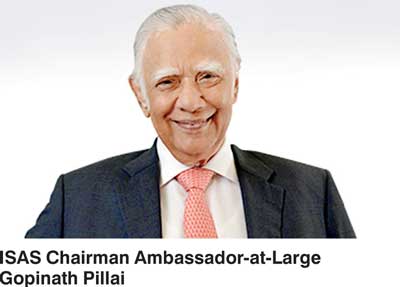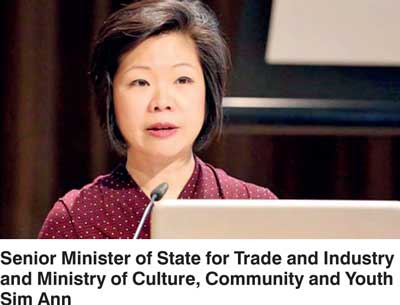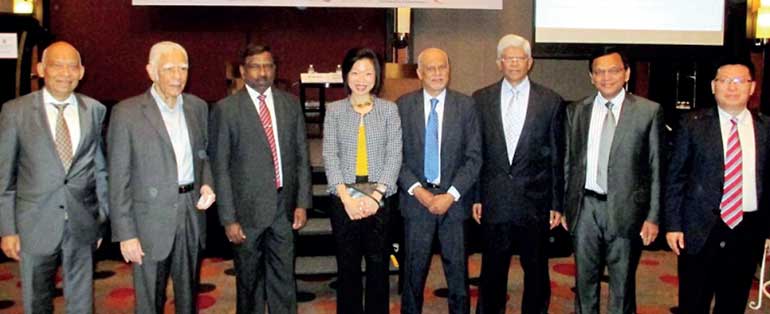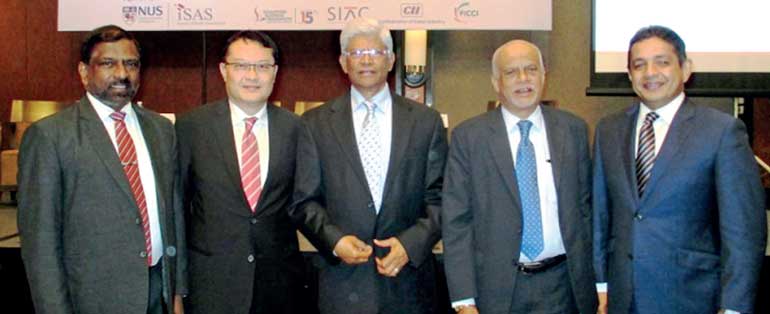Friday Feb 27, 2026
Friday Feb 27, 2026
Monday, 5 February 2018 00:00 - - {{hitsCtrl.values.hits}}
Addressing the joint symposium conducted by the Institute of South Asian Studies (ISAS) of the National University of Singapore (NUS) on the Belt and Road Initiative, held in collaboration with the Pathfinder Foundation (PF), Singaporean Senior Minister of State for Trade and Industry and Ministry of Culture, Community and Youth Sim Ann in in her key-note address said that the Chinese initiative is unique in the contemporary world in the field of infrastructure development, transport, banking etc.
She said that Singapore as a nodal point in BRI will be ready to provide financial, legal and other professional services to countries that would join the Chinese mega venture. She explained that the Chongqing Connectivity Initiative (CCI) is Singapore and China’s third joint project, after Suzhou Industrial Park and Tianjin Eco-City.
 The CCI aims to help drive growth in China’s less developed western region by improving Chongqing’s transport and services links to the region and beyond. The Southern Transport Corridor (STC) connecting the south-western city of Chongqing with Guangxi as well as Guizhou and Gansu provinces will cut current transport time between China and Singapore from three weeks to just one week. Launched during President Xi Jinping’s visit to Singapore in November 2015, the CCI focuses on modern connectivity and services and is aimed at boosting growth in China’s western regions. Less than four months since its launch, the CCI had garnered 260 initiatives worth $ 115 billion, according to the background information booklet relating to Chongqing’s economy released in early 2016.
The CCI aims to help drive growth in China’s less developed western region by improving Chongqing’s transport and services links to the region and beyond. The Southern Transport Corridor (STC) connecting the south-western city of Chongqing with Guangxi as well as Guizhou and Gansu provinces will cut current transport time between China and Singapore from three weeks to just one week. Launched during President Xi Jinping’s visit to Singapore in November 2015, the CCI focuses on modern connectivity and services and is aimed at boosting growth in China’s western regions. Less than four months since its launch, the CCI had garnered 260 initiatives worth $ 115 billion, according to the background information booklet relating to Chongqing’s economy released in early 2016.
The joint symposium was inaugurated by ISAS Chairman Ambassador-at-Large Gopinath Pillai. Stating that this was the first occasion Singapore conducted a symposium on the BRI and that Singapore’s enthusiasm could be observed by the large attendance at the event, Pillai said that his institute was happy to disseminate information on BRI. He added that his institute would also study and discuss all international development initiatives, including the proposed Asia-Africa Growth Corridor, in addition to the BRI.
At the invitation of PF, two academics from the Sichuan University of China, ISAS Myanmar Studies Director Prof. Dai Yonghong and Sichuan University School of International Studies Associate Dean Huang Yungson, took part in the Symposium and made presentations on the China-Myanmar Economic Corridor and cyber security issues relating to the BRI.
The day long symposium, held on 29 January in Singapore, was attended by over 170 participants, and discussed Politics, Potentials and Partnerships relating to the BRI. The broad areas that were discussed covered, ‘Understanding the Political and Security Issues’, ‘Regional Relevance of the BRI’ and ‘The BRI and Economic Potentials’ of the grand Chinese initiative that would see $ 1 trillion investment on infrastructure development and related projects, embracing approximately 70 countries in Asia, Africa and Europe.

PF Chairman Bernard Goonetilleke in his introductory address welcomed the Guest of Honour Sim Ann and emphasised the importance for participating countries to come up with projects which would provide reasonable return on investment and minimise negative consequences, such as degradation of the environment. He expressed the hope that both ISAS and PF would continue collaborating on the BRI and other issues of mutual interest in the future as well. PF Executive Director and China-Sri Lanka Cooperation Studies Centre Director Luxman Siriwardena said, while physical infrastructure development and connectivity improvement could be achieved through BRI, the fundamental requirement for sustainable development is the implementation of reforms in economic policy and institutions and ensuring transparency and accountability in transactions. Therefore, he emphasised the need for advocating reforms in the process of implementing the BRI. Admiral Dr. Jayanath Colombage analysed the geo-strategic concerns of the regional countries and pointed out that there is increased militarisation and nuclearisation of the Indian Ocean Region (IOR) and that an unofficial cold-war is developing in the region, which is detrimental to the progress of the states in the IOR. Admiral Dr. Colombage elaborated the need to develop regional solutions to regional problems and need for increased collaboration to develop a regional maritime security architecture. He referred to the Indian Ocean as a Zone of Peace initiative mooted by Sri Lanka in 1971 and the relevance of the conditions in the region even in the current context.

Pathfinder Participant with Prof. Subrata K Mitra, Ambassador-at-Large Gopinath Pillai, Admiral Dr. Jayanath Colombage, Sr. Minister of State Sim Ann, Luxman Siriwardena, Bernard Goonetilleke, Deputy High Commissioner of Sri Lanka Ameer Ajwad, and Prof. Dai Yonghong
Presentations were made by John Keells Holdings Executive Vice President and Transportation and Logistics Sector Head Zafir Hashim on Implications of Maritime Silk Road for Sri Lanka and the role played by his group of companies, and CHEC Port City Colombo Chief Sales and Marketing Officer Liang Thow Ming, who provided background information on the Colombo Port City development under the BRI to the Singaporean audience.

Participants from Sri Lanka: Admiral Dr. Jayanath Colombage, Liang Thow Ming, Bernard Goonetilleke, Luxman Siriwardena and Zafir Hashim
Among the panellists representing ISAS were Principal Research Fellow Dr. Iftekhar A. Chowdhury; Senior Research Fellow and Research Lead (Trade & Eco.) Dr. Amitendu Palit; Dr. Gong Xue of S. Rajaratnam School of International Studies; Nanyang Business School NTU-SBF Centre for African Studies Director Johan Burger, and Singapore International Arbitration Centre Deputy Registrar and Centre Director Kevin Nash. Concluding remarks were made by ISAS Director and Visiting Research Professor Prof. Subrata K. Mitra.